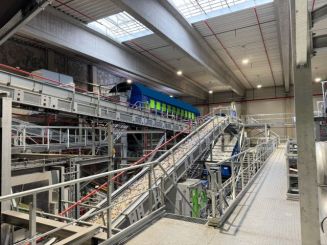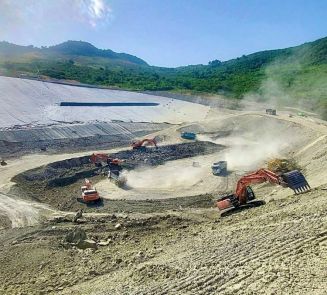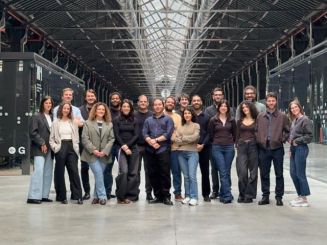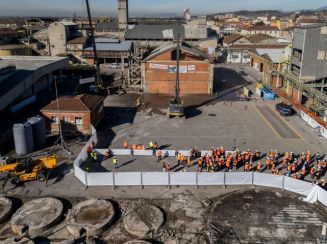
The RePlaCe Project: “Plastic as a support for Environment”
Can plastic become a renewable resource at the end of its life cycle?
A tangible response comes from four companies specialized in plastics industry. Due to the RePlaCe Project (co-funded by the European Program LIFE+), these companies have realized an industrial conveyor belt whose structural components are made of recycled plastic instead of metal.
Developing innovative technologies, views, and tools in order to consolidate and implement politics aimed at ensuring a sustainable management and use of resources and waste are the main goals of the RePlaCe Project. All this is done paying particular attention to the product’s life cycle, the “green” design of products, and to the development of the recycling markets.
Thanks to the RePlaCe Project in 2013 three companies specialized in different plastics processings and a multi-utility company managing the waste collection made a prototype of a conveyor belt whose structural components are made of recycled plastic.
These four companies played a decisive role in this challenge: Plastic Metal S.p.a. provided its own injection moulding machines for thermoplastics in order to produce recycled plastic components. F.lli Virginio s.r.l. designed and assembled the conveyor belt. Then, Vivi s.r.l. analyzed the material and the moulds for plastic components. Last but not least Etra took charge of different tests, managing a waste separation center.
Using recycled plastic for the production of new products means make the most of waste recycling plants, especially lower the waste volume designed for disposal. For this reason in 2008 a collaboration between Plastic Metal S.p.A., F.lli Virginio s.r.l. and Vivi s.r.l. started with the aim of using recycled plastic, considerably presents in the market, as the perfect metal substitute in the production of conveyor belts. Due to this first experience with the RePlaCe Project it was possible to produce a modular conveyor belt whose structural components made of aluminum and iron were replaced by recycled plastic components. In addition, it was possible to maximize volumes involved in transit. Our European customers have been able to benefit from such innovation. The distribution of our new product, therefore, is achieving good outcomes.
On the one hand these companies focused on its own production, on the other hand they cooperated with the others, consulting each other promptly over any problem, finding the best solutions. A new-generation conveyor belt which can be used in any manufacturing industry, also in packaging industry, is the outcome of this project since the structure of the conveyor belt components meet the current health regulations.
The second step of this project was to add another fundamental component of the conveyor belt made of recycled plastic, that is to say the belt. Up to now, belts were made of PVC, TPU, synthetic rubber or virgin plastic; these products were available in different types according to the product that had to be conveyed.
Producing a recycled plastic belt without compromising its own efficiency and functionality was the main goal of this second step. This belt must be modular and all its structural components, such as pulleys, drive unit gears and pinions, must guarantee perfect movements and wear resistance. The starting point of this project is the actual needs of our customers.
A second goal of this project is the implementation of a new plastic collection from domestic waste in Veneto Region, so that it is possible to obtain a recycled material which is more homogeneous. This part of the project will be covered from the Etra S.p.A. Group.
Firstly, it was necessary to analyze the mechanical properties of the structural components of the belt in order to identify the optimal composition of recycled plastic and additives necessary to guarantee high performance of the conveyor belt submitted to static and dynamic loads.
The belt consists of a series of modules hooked on each other with no metal pivots. This particular joint configuration confers resistance and stability to the belt both in cross and diagonal direction.
The belt is actuated by a positive driving system through plastic pinions obtained by moulding or mechanical processing. The surface of the belt may be “an open area surface”, “ a closed area surface”, “with vertical profiles” (slats) or “lateral protections” according to customers’ needs.
Our experts pay particular attention both to the belt design and material that is made of: the simulations of the deformation after molding are significant, consequently the material must be soft enough to bear these stresses.
In order to make this project useful both in practical and economical terms, every decision was taken looking at low environmental impact, high-technologies and high value for money.
The benefits of this project, therefore, can be summarized as follow:
- environmental benefit achieved by lowering plastic waste;
- energy benefit since plastic recycling processing involves less energy consumption than aluminum production processing;
- energy and economic saving since plastic molding processing involves high performance machineries and low energy consumption.
If studies, findings and achievements of this project are broadened to other products, there will be a sharp increase of recycled plastic use. Not only the environment, but also waste recycling institutions and companies will take full advantage of this project. Recycling waste and recycling them in a correct and functional way will become part of our collective consciousness considering that what we discard today, it will become a new recycled product tomorrow.
Profilesof the partner companies and functions
Plastic Metal S.p.A. – a leading Italian manufacturer for more than fifty years. Its injection molding machines are characterized by double toggle closing system and clamping forces from 50 to 3200 tons. For nearly a decade the company has developed a line of environmentally friendly machines, named MULTIPOWER, with hybrid technology that ensures the highest performance and saves energy up to 50% compared to the traditional hydraulic technology. As part of this project Plastic Metal S.p.A. is responsible for the management, monitoring and control but, above all, thanks to its technical knowledge, creates the necessary facilities for the development of the prototype. The machines used are Multipower, suitably adapted to the molding of the recycled materials chosen for the realization of the structural elements of the conveyer belt. http://www.plasticmetal.it/.
F.lli Virginio S.r.l. manufacturer, for over forty years, of conveyer systems, automation and accessories for the plastic processing industry. They supply fully automatic systems thanks to their long experience and continuous research of innovating solutions. Together with the NPM Group, the center of advanced research and development, F.lli Virginio S.r.l. develops projects of pilot plants for the production of artifacts and plastic items for construction industry, using domestic and industrial waste products as raw material. It is also developing a project of a new machine for grinding the recycled material. http://www.plasticmetal.it/.
For the RePlaCe Project, F.lli Virginio S.r.l. has developed the conveyor design and it is studying solutions to integrate recycled plastic components with the standard structure of the conveyor belt in close collaboration with other partners. The company has submitted the prototype to dynamic and static tests in order to identify any critical issues in the operation and check the wear of components. http://www.fllivirginio.it/.
Since many years Vivi S.r.l. has developed experience in furniture industry, producing components for the production of interiors, chairs and armchairs with high aesthetic and functional value. The update on the new high-performance materials and testing of inedited applications have enabled Vivi S.r.l. to operate successfully in areas of high technical content, such as medical and sports. Research on thermoformed elastomers demonstrates the taste for innovation of Vivi s.r.l. and this has resulted in the creation of a new plastic material with high mechanical strength and softness for the implementation of anti-shock protection in sports. In this project, Vivi S.r.l. deals with the molding of recycled plastics, using specific resources and equipment for processing plastics. The company provides the project with experience in the treatment of plastic, with the aim of finding the appropriate composition of plastic and to study the morphology of the correct components in order to facilitate the final assembly of the conveyor belt. http://www.vivisrl.it/.
ETRA S.p.A. is another partner of the project. This company deals with integrated water services, waste services and other services for many municipalities in Veneto Region. Etra S.p.A. carries out final tests on the prototype and it is responsible for communication and training activities for public consciousness on recycling and environment issues.
















